 Technology peripherals
Technology peripherals
 It Industry
It Industry
 The European Cup's 'Special Chinese Advertisement” is a big business
The European Cup's 'Special Chinese Advertisement” is a big business
The European Cup's 'Special Chinese Advertisement” is a big business
Virtual advertising was introduced for the first time in the European Cup, and Chinese fans became the first guinea pigs for the new technology.
Author | Cao Siqi
Editor | Zheng Xuan
The European Cup is here, have you watched the football?
Every sports competition will evolve into a national discussion based on sports on social media. Often the hottest topics discussed have little to do with the event itself.
For example, few people will care about the victory or defeat of the two teams, Turkey and Georgia, at 12 o'clock at night, but there is a high probability that we will all be attracted by the overwhelming Chinese advertisements in the broadcast footage.
Logically speaking, Hisense, Alibaba Group, BYD and vivo are all official sponsors of the European Cup and have spent real money, so it is not surprising that their advertisements appear on the sidelines.
But what’s interesting is that in the past, Chinese companies that participated in competition sponsorships usually only displayed their brand names simply. The Chinese advertisement for this competition contains too much information. So much so that domestic fans need to look away from the game itself for a short time to read the densely packed Chinese advertising slogans:
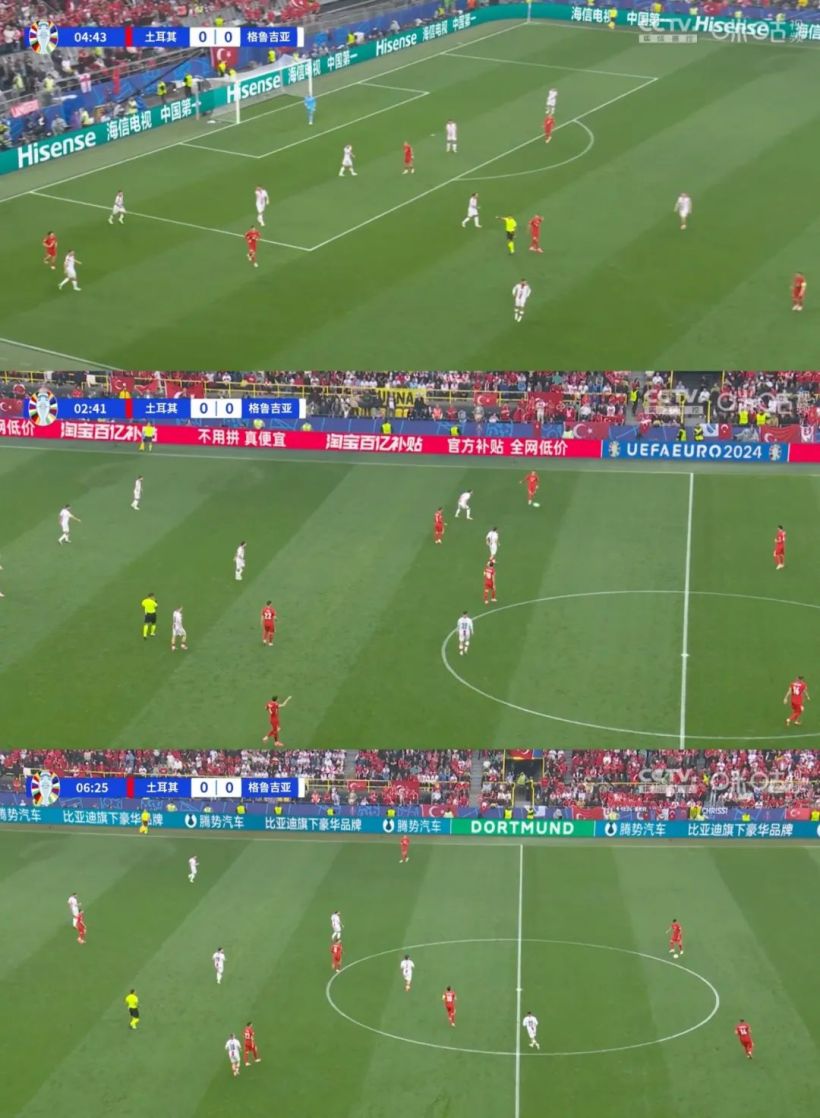
Even not only Chinese sponsors, but also eye-catching Chinese characters appear in the advertisements of two international giants in the travel field, Qatar Airways and online travel platform Booking.com:
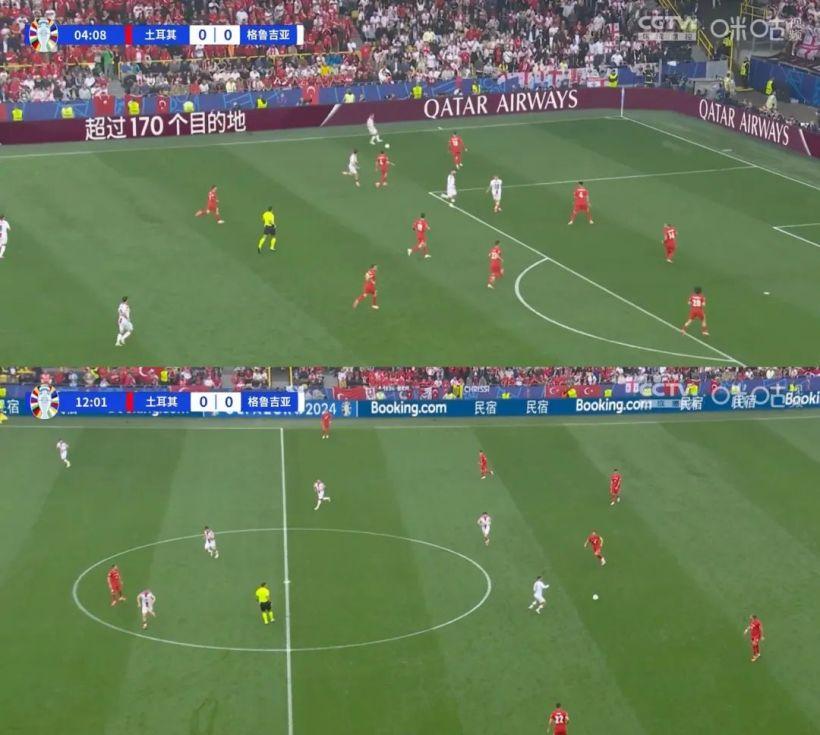
The screen started to become very inconsistent and confusing. Can the 50,000 to 60,000 European fans present really understand what these mean? Even if they know each other, European consumers don’t use Taobao, and BYD’s factory in Europe has not yet been completed. What is the meaning of these Chinese advertisements?
Which country should consumers see the European Cup advertisements?
01, The advertisement you saw this time, is indeed the "Special Edition"
Put the answer at the front: Chinese fans, this time we did see the "Special Edition" in Chinese advertise.
The realization of special edition advertising relies on a technology called "virtual real-time advertising". Although this technology is not considered "cutting-edge" and the principle itself is close to the green screen keying commonly used in radio and television production, this is the first time it has been officially used in the European Cup. Interestingly, in this tournament, only the host position of the broadcast camera used virtual real-time advertising technology. Therefore, once the broadcast camera switches to a close-up during the game, careful viewers can also spot clues of the special advertisement.
Chinese fans are not the only ones who saw the special advertisement. According to UEFA's description, a total of 4 sets of broadcast signals are provided for this tournament. In addition to international public signals, exclusive signals are also provided to the host country of Germany, China, and the United States.
The biggest difference between special signals and unprocessed public signals is that the former can use virtual advertising technology to change the content of the stadium into a billboard.
For the Chinese and American markets, the change is that sponsors can adjust advertising content to specific markets, that is, "same sponsor, different communication content." It is understood that except for Hisense, the other three Chinese companies all borrowed these technologies in the early stages of this competition and chose advertising slogans with Chinese characters as communication content in domestic signals.
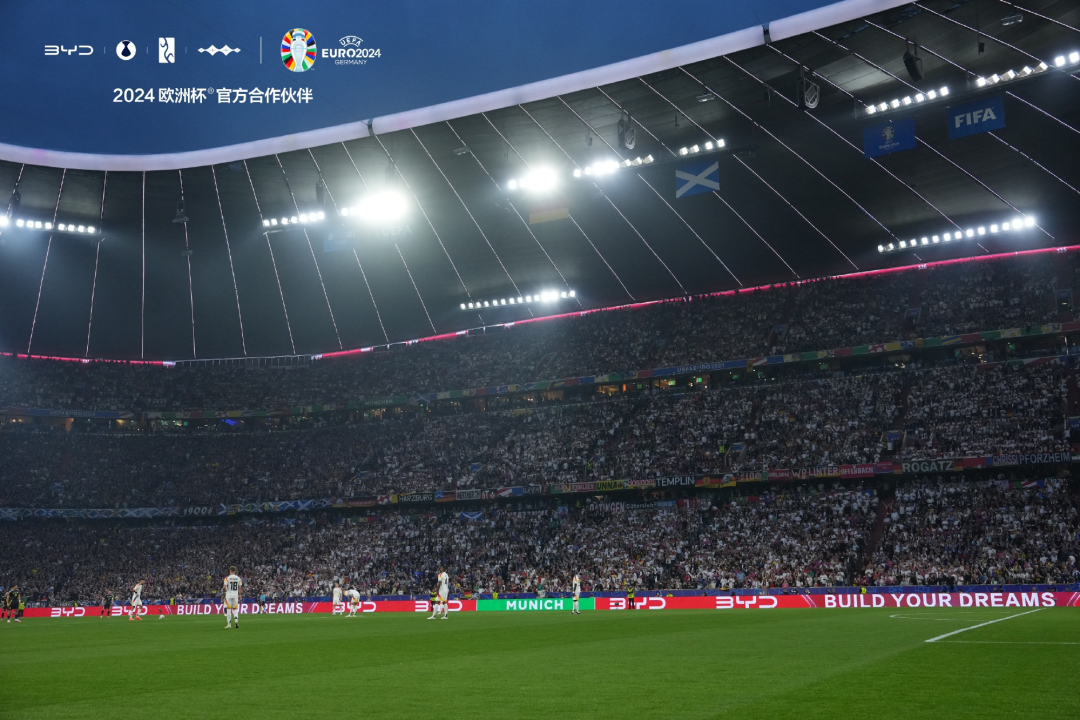
For the host country Germany, in their special signals, some advertisements that were not physically displayed on the sidelines will also be Being added to the broadcast screen is equivalent to the event organizers opening up a new online advertising space in addition to the traditional offline space.
The virtual real-time advertising technology service provided for this event is provided by an international digital marketing company called AIM SPORT. In fact, AIM SPORT has been providing this service to a number of European professional clubs since 2018. So, why did it take until 2024 for major international events such as the European Cup and World Cup, which have dozens of global sponsors, to finally use this technology?
The answer should have nothing to do with technology or cost. From a cost perspective, compared with VAR (video assistant referee) and semi-automatic offside technology that FIFA and UEFA have vigorously promoted in recent years, it does not require the pre-installation of a large number of cameras and sensors, and the cost is very low.
The core lies in "human subjective choice". As the first group of players, La Liga and the Bundesliga regional professional leagues have a relatively stronger willingness to open up the international market. Through virtual advertising technology, clubs can promise some small and medium-sized sponsors rights that they have not been able to obtain in the past.
Sideside advertising is an important sales product for every sports event organizer, and has long followed the principle of "paying money to buy exposure". The rule tends to be: the more money you spend, the longer the ad time, and the better the ad time. In the past, for a regional sponsor with limited financial resources, money may have been spent, but the advertising time was extremely limited, and the willingness to participate was naturally not very strong.
With the support of virtual advertising technology, regional sponsors can get longer exposure in the broadcast. It is equivalent to expanding a new space based on the traditional offline space. According to the financial report of the German club Borussia Dortmund, in the 2018-19 season, the club achieved a 76% increase in advertising due to the use of virtual advertising technology.
The use of virtual advertising has achieved immediate results. Before the start of the European Cup, UEFA's marketing director Epstein predicted that revenue from this European Cup is expected to increase by 25% to approximately 2.4 billion euros. "Technology allows us to manage business projects in different ways."
The debut of this mature technology in an international competition also brings more new possibilities for future sports events and even content marketing.
02, The ultimate goal of technology is to reduce costs and improve efficiency
Then the problem comes again.
It seems that with the help of technology, UEFA has sold regional sponsors in Germany at higher prices. But there are sacrifices. The exposure time gained by regional sponsors is actually lost by global sponsors (because there are no physical advertisements for regional sponsors on the sidelines). If they say "refund" to UEFA, It seems like a really reasonable and embarrassing thing.
So, the real test does not lie in the technology itself, but in how to balance the business balance that is broken after the entry of new technologies. After all, the technology itself does not only serve the so-called "precision marketing" of sponsors, but also to maximize the interests of IP parties and advertisers.
For example, at the World Cup in two years’ time, will FIFA also add virtual advertising technology to allow different regional sponsors to gain longer exposure time in each other’s markets?
At the 2022 World Cup in Qatar, FIFA opened up the rights of regional sponsors to 5 different continents (regions) and secured a total of 18 sponsorship seats, which is the sum of all sponsors of the European Cup. But they can only share sponsorship time. If 5-way signals can be produced using virtual technology, then each company’s exposure time can in principle be expanded by 5 times.
In the advertising industry, there is a classic saying: "I know half of the advertising dollars are wasted, but I don't know which half." Advances in technology are expected to exponentially increase the efficiency of advertising operations and bring higher profits to IP parties.
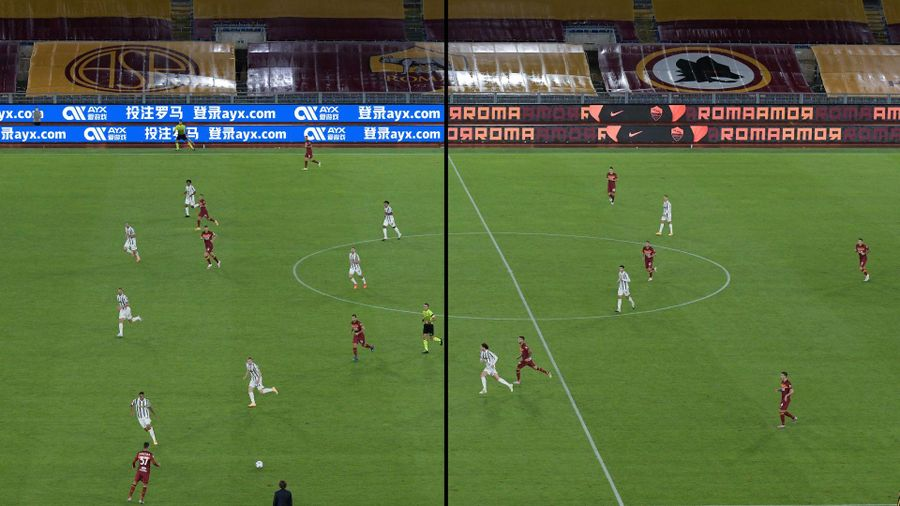
Another example, in every competition, various sponsors will purchase pictures and even brand photographers will take a large number of " "Rights", the core is to make the wonderful moments of the event and its own brand image in the same frame, and deepen the brand impression through subsequent communication and fermentation. But under the current operating paradigm, this behavior is still random and inefficient in nature. No one can predict what will happen in the next second of a sports match, and no one knows which lucky company’s logo will appear on the LED screen on the sidelines when a classic happens.
If we add generative AI to the marketing process, the photographer is still responsible for capturing every wonderful moment on the field, but the billboards on the sidelines can be replaced with specified content through AI technology. From a technical point of view, this is not complicated. The essence is to combine the cutout and image expansion functions of large models. Currently, flagship AI models launched by many domestic mobile phone manufacturers can already achieve similar operations through cloud models.
Apart from technology, it is indeed an extremely difficult thing to implement. First of all, each sponsor cannot be allowed to replace the background of a classic moment with its own logo, otherwise the classic will be devalued. If the highest bidder takes the approach, it will inevitably break the law of luck under the current model and cause damage to the interests of other sponsors.
In domestic NBA broadcasts, broadcasters have tried to use AR technology to display advertisements on the floor. This may be a new idea for developing sponsorship rights. When physical space is limited, developing "cyber advertising space" is also a new idea.
You must know that in order to respect "fundamentalism", the Olympic Games have so far not allowed any commercial elements in the venues. If the communication medium is switched and only commercial elements and advertising information are presented online, it may be able to bring more commercial income to the event, and also bring more significant marketing effects to those Olympic sponsors who have spent sky-high prices.
Under this idea, not only the event side can sell more rights, but the brand side can also have more choices. In the Qatar World Cup final, due to the direct dialogue between the two spokespersons Messi and Mbappe, Mengniu temporarily adjusted its advertising slogan before the start of the game and moved popular memes from the Chinese Internet to the final scene.
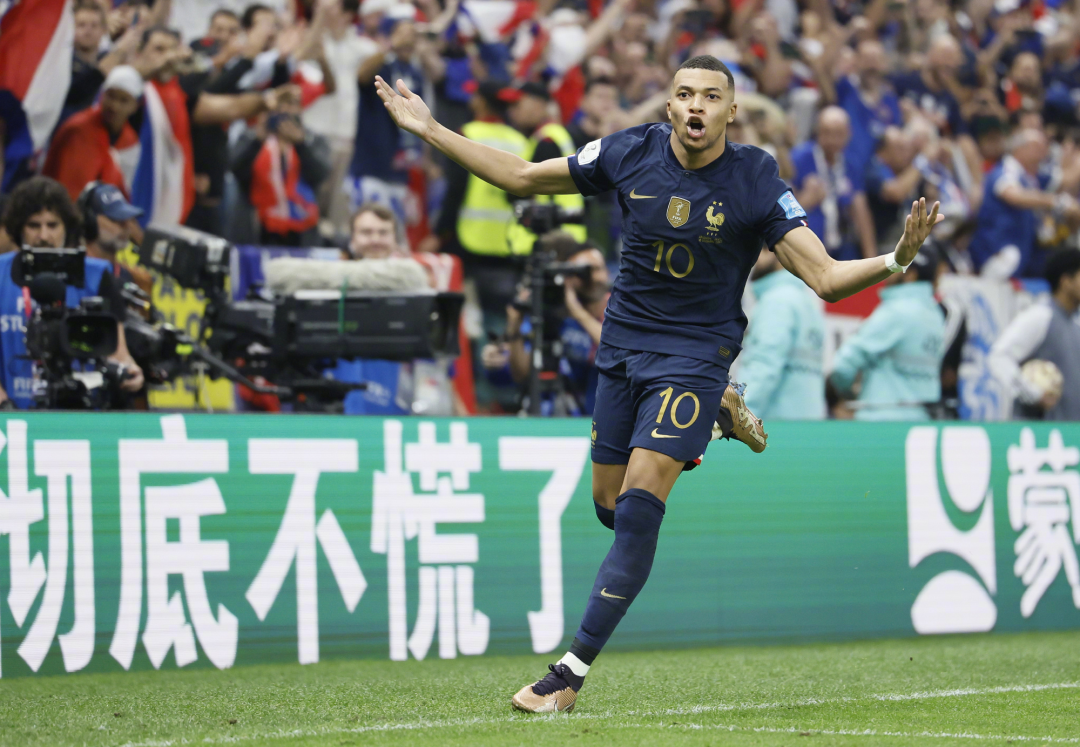
When sponsorship rights become more segmented, cheaper sponsorship options are bound to appear. Think boldly, is it possible for you and me to appear on the sidelines of a top-level event through crowdfunding in the future? It may be difficult to compete with mature super-large international events such as the World Cup and European Cup, but for content IP that is still growing, embracing technology also means embracing more business opportunities.
It is undeniable that in the future, whether it is sports competitions or content consumption scenarios, there will be more and more optional advertising spaces on different devices and platforms. Technology has never been a difficult point. How to combine technology with "human logic" without destroying business balance is the key issue that tests business managers.
This article comes from the WeChat public account: Geek Park (ID: geekpark), author: Cao Siqi
The above is the detailed content of The European Cup's 'Special Chinese Advertisement” is a big business. For more information, please follow other related articles on the PHP Chinese website!

Hot AI Tools

Undresser.AI Undress
AI-powered app for creating realistic nude photos

AI Clothes Remover
Online AI tool for removing clothes from photos.

Undress AI Tool
Undress images for free

Clothoff.io
AI clothes remover

Video Face Swap
Swap faces in any video effortlessly with our completely free AI face swap tool!

Hot Article

Hot Tools

Notepad++7.3.1
Easy-to-use and free code editor

SublimeText3 Chinese version
Chinese version, very easy to use

Zend Studio 13.0.1
Powerful PHP integrated development environment

Dreamweaver CS6
Visual web development tools

SublimeText3 Mac version
God-level code editing software (SublimeText3)

Hot Topics
 1664
1664
 14
14
 1423
1423
 52
52
 1318
1318
 25
25
 1268
1268
 29
29
 1248
1248
 24
24
 CNCF Arm64 Pilot: Impact and Insights
Apr 15, 2025 am 08:27 AM
CNCF Arm64 Pilot: Impact and Insights
Apr 15, 2025 am 08:27 AM
This pilot program, a collaboration between the CNCF (Cloud Native Computing Foundation), Ampere Computing, Equinix Metal, and Actuated, streamlines arm64 CI/CD for CNCF GitHub projects. The initiative addresses security concerns and performance lim
 Serverless Image Processing Pipeline with AWS ECS and Lambda
Apr 18, 2025 am 08:28 AM
Serverless Image Processing Pipeline with AWS ECS and Lambda
Apr 18, 2025 am 08:28 AM
This tutorial guides you through building a serverless image processing pipeline using AWS services. We'll create a Next.js frontend deployed on an ECS Fargate cluster, interacting with an API Gateway, Lambda functions, S3 buckets, and DynamoDB. Th
 Top 21 Developer Newsletters to Subscribe To in 2025
Apr 24, 2025 am 08:28 AM
Top 21 Developer Newsletters to Subscribe To in 2025
Apr 24, 2025 am 08:28 AM
Stay informed about the latest tech trends with these top developer newsletters! This curated list offers something for everyone, from AI enthusiasts to seasoned backend and frontend developers. Choose your favorites and save time searching for rel



